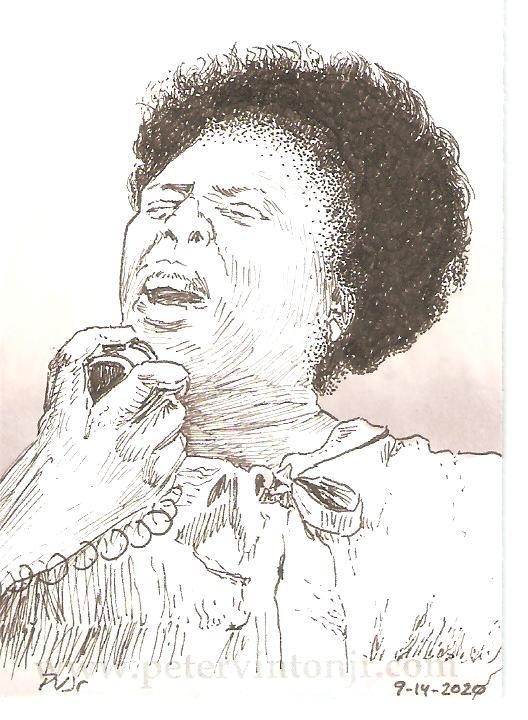
An ongoing illustrative history study
This piece originally posted 10/26/2020
Prelude | 47 | 48 | 49 | 50 | 51 | 52 | 53 | 54 | 55 | Email |
|---|
"Sometimes it seem like to tell the truth today is to run the risk of being killed. But if I fall, I'll fall 5 feet 4 inches FORWARD in the fight for freedom. I'm not backing off."
Born to sharecroppers in 1917, activist Fannie Lou Hamer (neé Townshend) lived out her entire life refusing to apologize for her own existence, bringing a unique blend of rage, practicality, and eloquence to her speeches.
Fannie Lou and her husband Perry adopted two daughters in the 1940's, and then in turn became the legal guardians of their own grandchildren after their eldest daughter died. Some years later Hamer herself was sterilized without her knowledge or consent in 1961; given a hysterectomy while in a hospital for minor surgery, a procedure so common it was known then (as now) as a Mississippi Appendectomy. This atrocity set her on the path to civil rights.
A year later (1962) she organized the Student Nonviolent Coordinating Committee (SNCC), joining 17 of her Black neighbors on a bus to Indianola (the Sunflower County seat), where they attempted to register to vote. Most of the group was barred from even entering the building; only Hamer and one other man were permitted to register but were then forced to take a punitive literacy test --which they both failed. On the trip back, the bus was pulled over and its driver arrested on a nonexistent infraction. The passengers pooled bail money for the driver but by the time Hamer got home, her landlord W. D. Marlow had already learned of her attempt to register to vote and demanded she withdraw her application. When she refused, she and her family were evicted. In the face of harassment, extortion, and assault by white supremacists (and their friends/allies on the police force), the Hamers moved to a neighboring county. But by then her resolve was implacable. She attempted the literacy test a second time in December of that year, then again in January of 1963. On this third occasion she passed... but was then turned away when she was unable to produce poll tax receipts from the previous two attempts (legal under an obscure 1870 state law).
Later that year Hamer and the SNCC organized the 1963 Freedom Ballot, and then the "Freedom Summer" initiative, in which she helped to prepare and educate would-be Black voters about legal disenfranchisement statutes, such as the ones that had tripped her up. During one incident on June 8, 1963, she and five of her fellow activists participated in a sit-in at a Winona lunch counter, for which they were arrested and severely beaten --Hamer was reported as "insufficiently deferential" and sustained permanent damage to her eyes, legs, and kidneys. The group stayed in jail for 4 days, being released on June 12: mere hours after her friend Medgar Evers had been murdered just 115 miles away in Jackson.
Outraged, Hamer co-founded the Mississippi Freedom Democratic Party (MFDP) in 1964 and ran for the U.S. Senate that same year. She later ran for the Mississippi State Senate in 1971; both of these campaigns were ultimately unsuccessful, though she was elected a delegate to the Democratic National Convention in 1972. In her later years she organized the Freedom Farm Collective (FCC), an advocacy group that pushed for equality in land ownership --galvanized, likely, by her sharecropper childhood. In Hamer's view, African-Americans were not technically free if they were not afforded the same opportunities as whites... including those in the agricultural industry.
Hamer died of hypertension and other complications brought about by her 1963 injuries. But until her dying day (Mar 14, 1977) she refused to stay silent or to lighten her tone, or to soften her rhetoric. The Third Annual Women's March (Jan 19, 2019) was dedicated to Hamer's life and legacy.
Next page - Lesson 52: Diane Nash